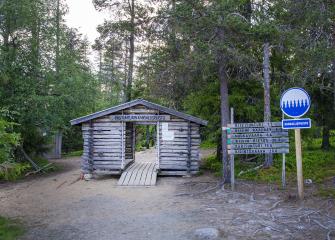Recreation in nature

Nature offers a good setting for activities and recreation, which supports overall well-being and helps us cope with everyday life. Nature is known to have many benefits for physical and mental health. For example, elevated blood pressure, the heart rate, and muscular tension go down, and the number of white blood cells increases, boosting the immune system.
Nature is of great significance for children and families. A person's relationship with nature is usually established through childhood emotional experiences. In nature children have a chance to develop many skills and strengths in a way that is not possible in day-care centres or classrooms. For children functional learning, such as climbing trees or playing hide-and-seek is fun and stimulating. Problems with concentration, overstimulation, and impulsiveness are also stabilised by being out in nature.
Everyman's rights enable spending time in nature
Everyman's rights are the right of every person to use nature regardless of who owns or controls the land. The use of nature within the limits set under the everyman's rights therefore does not require the permission of the landowner and using the rights does not cost anything. Operating under everyman's rights must not cause more than minimal harm to the landowner, the use of land, or nature.
Observe outdoor etiquette
Remember to respect nature when you move about, camp, or light a fire, and keep a bag for waste with you.
Take possession of etiquette and always familiarise yourself with the place where you are going:
- Respect nature - do not alter it. Keep pets on a lead.
- Favour marked paths and follow rules that apply to different ways of moving about. Check the restricted areas and times on movement at your destination.
- Camp only where camping is allowed. Do not wash dishes or bathe directly in a body of water. Follow the rules of wilderness huts.
- Light fires only in places where it is permitted. Use a camp stove, if possible. Do not light a fire when a forest fire or grass fire waning is in force.
- Do not litter.
Take a hike in nature
Finnish nature is a destination that is always open, offering a great variety of experiences both winter and summer, day, and night. It is best for beginners get off to a gradual start, and to advance to more challenging outdoor activities, such as wilderness hiking, as experience accumulates. It is important to always pay heed to safety, especially in winter. Although wolves and bears strike fear in nearly half of Finns, the real dangers in nature are getting lost, falling, drowning, and tick bites. Finnish nature is nevertheless a very safe place to be, and serious accidents are rare if meticulous preparations are made.
Finland is full of beautiful and memorable hiking destinations
Nearby nature areas, such as one's own back yard, parks, nearby forests, and municipal nature trails are among the most popular nature destinations. Hiking in nature usually involves travel to a more distant nature site. National parks include some of the most impressive and beautiful examples of nature with services that benefit hiking, such as good parking facilities and places to light fires, as well as toilets. Marked nature trails reduce the danger of getting lost and make walking easier. In the wilderness areas of the north of Finland it is possible to wander for days without meeting anyone.
Hiking location tips
Find your own way to move about in nature
Finland is the promised land for outdoor enthusiasts! Finland has many magnificent hiking destinations where you can get exercise, ski, cycle, or engage in whatever activity suits you. You can do it on your own, with friends, or with your family. There are also easier trails for people with physical limitations. Speed is not always as important as feeling good. Remember to go out into nature regularly to get exercise and to feel good.
Fishing and outdoor activities are an important part of Finnish culture
With its thousands of lakes and forests this country would not be inhabited if our ancestors had not come here after the ice age to hunt and fish. Fishing and hunting are still popular ways of spending free time, offering unforgettable experiences. According to research, fishing, wilderness activities, as well as outdoor life help promote health. State-owned land and waters make it possible for all Finns to fish and move about out of doors, as long as permits and obligations are in order. Fishing and hunting should always be practised in accordance with the principles of sustainable use, taking into account the preservation of nature, living environments, and human livelihoods.






